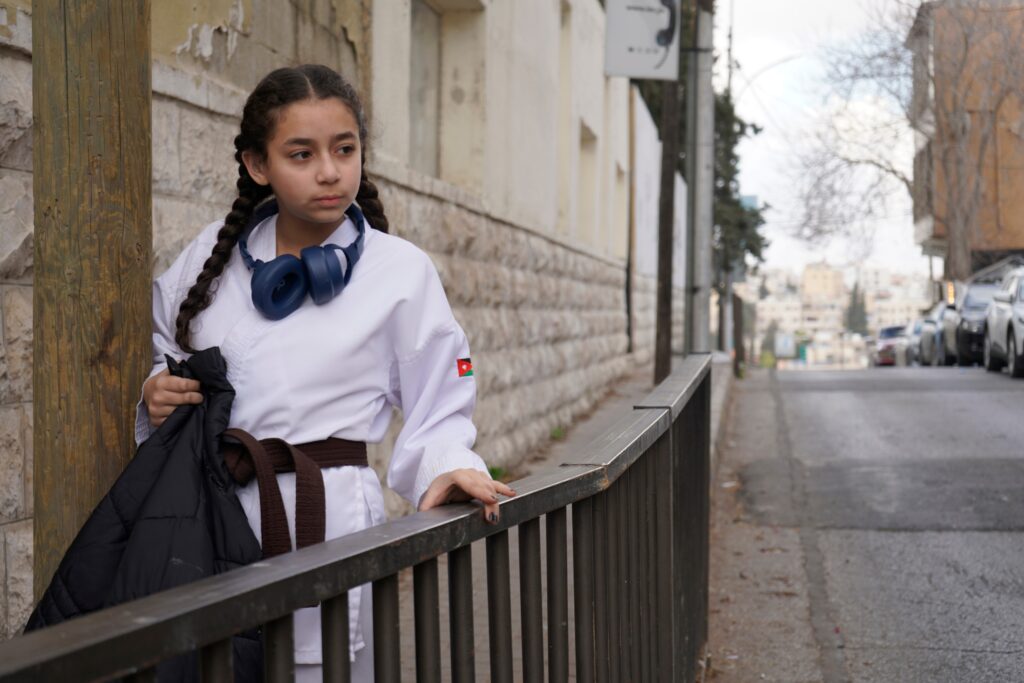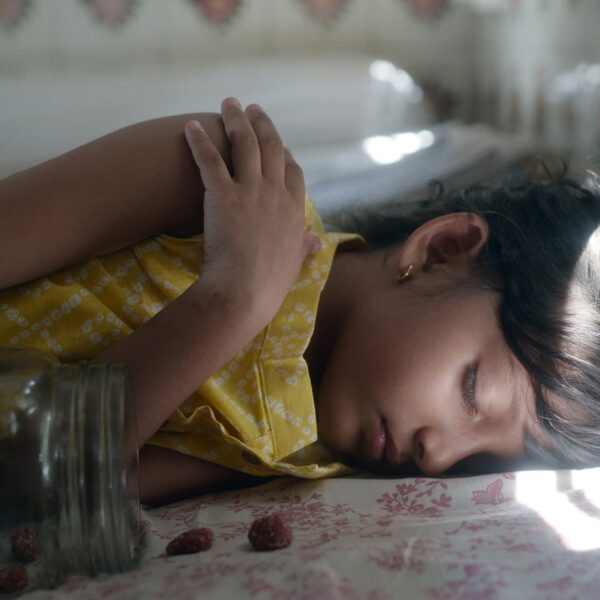A review of the Kplus short film program
For once, I managed to fit the entire Kplus short film program into my schedule this year. Unlike the selection of feature-length films, which is quite repetitive this year, especially in combination with the 14plus feature-length films, the short film selection at Kplus is at least coherent and simultaneously very diverse.
Sexual violence and breach of trust
Particularly memorable for me is Sukoun by Dina Naser. Hearing-impaired Hind (Malik Nassar) has a passion for karate. In a world that is not designed for the hearing impaired, her karate studio is her safe space. She is fond of the other students and her mentor. Until the day she is sexually assaulted. It captures with impressive urgency and sensitivity how children can suffer sexual abuse. That it is primarily persons of trust and authority who confuse, manipulate and exploit children. That affected children (and ultimately adults too) find it difficult to speak out about what has happened and to seek help. After all, if trust in a person who was previously held in such high esteem is broken, how can you confide in other people afterwards? Sukoun is a moving, heartbreaking movie. The sound design allows the audience to immerse themselves in Hinds' hearing-impaired world from the very first minute. Without any explanatory words, we dive straight into the story and immediately understand what is happening. Malak Nassar takes us on a journey into the deaf and hearing-impaired world without appearing powerless.
Sukoun provides a voice for people who are still not seen or heard often enough - both hearing-impaired people and survivors of sexual violence. I would have liked to have seen a final impulse to turn to parents or other trusted people, at least after a few days or weeks. Although it realistically captures how difficult it is for Hind to communicate what has happened, the film is above all eye-opening for parents and other people close to those who have suffered sexual abuse. For the surviving children and people themselves, however, the short film is not empowering enough to suggest seeking or accepting help in these situations. All in all, however, it is an enormously important and cinematographically impressive film that I would have liked to have seen as a feature-length film.

Malak Nassar in Sukoun, © Baha’ Slieman, Madd Moshawas
The Butterfly
It takes a few minutes for me to understand why Papillon by Florence Miailhe is shown to the Kplus audience. After all, the animated film revolves around the life of a swimmer whose childhood we see very little of. When the swastika fills the screen, however, I understand immediately. Papillon is not a children's movie per se. But it is an awareness-raising film. An educational film about the cruelty of National Socialism in particular and fascism, racism and antisemitism in general. In German schools in particular, there is a lot of work being done to educate people about National Socialism. Nevertheless, the topic seems more pressing than ever, as secret meetings of right-wing extremist groups with specific deportation plans are being held.
Papillon recalls National Socialism in an enchanting animated style. Twelve hand-drawn images were used per second of film footage, which are impressive on the one hand and leave plenty of room for interpretation and imagination on the other. The mixture of urgency and the lack of traumatizing images make Papillon ideal educational material for a young audience, inviting more empathy and understanding than potentially dry history lessons (without wanting to brush all history teachers under the same brush).
Racism and fascism never "went away". It was just easier for white people like me to look the other way for a long time. But it's not just about political opinions, it's about human rights. About our democracy, for which so many people have died and continue to die around the world. Which is a distant dream for many countries and is taken for granted here. Papillon shows: we are stronger together. And it is up to us to protect our democracy.

Papillon, animated by Florence Miailhe, Aurore Peuffier, Chloé Sorin
Other stops on the world tour
In addition to these two films, which will stay with me for a long time and are still weighing heavily on me to this day, the rest of the short film program offers an insight into children's lives around the world.
Anaar Daana by Nishi Dugar addresses the contradictory instructions from adults that children often have to navigate. Questions about important issues such as illness and death go unanswered, while at the same time children are expected to miraculously understand that it is seemingly inappropriate to be playing. The lack of communication from parents and caregivers hits it right on the head.
In A Summer’s End Poem by Lam Can-zhao, we follow a boy's desire to express himself with a new hairstyle. In China, there are restrictive guidelines for school uniforms and hairstyles, which deprive children of all opportunities to develop and discover their own style. A story that seems completely unthinkable for children in Germany unfolds in an easy-going manner, shot as if on film.
Beurk! by Loïc Espuche is an entertaining and amusing film that charmingly removes the taboo from the subject of kissing for children and is likely to be a relief for many children. The transition from childhood to puberty tends to be very abrupt and confusing. Kissing is suddenly no longer disgusting, but should happen as soon as possible. Beurk! does its bit to smooth this transition a little and convey with a lot of humor that kissing doesn't have to be the most disgusting thing in the world, even for children.
Not all short films appealed to me. Goosfand, Porcelain, Aguacuario and Uli capture the everyday lives of children from Iran, Germany, Mexico and Colombia, but I find them lacking in plot or even a moral to the story. All in all, however, the short film reels result in a wide-ranging composition that takes us through the eyes of children all over the world.

